
|
If all men are created equal, are all employees as well? We'd like to think we apply the same level of respect to people of all rank and pay, but within an office culture, reality may paint a different picture. There is a very literal hierarchy of job titles, wages, and responsibilities that can cause a great degree of separation and even disrespect. To understand how this operates today, in a highly competitive world amid a pandemic, we spoke to more than 1,000 currently employed people in the U.S.
We wanted to know, do employees feel that some departments are more valued over others? Do employees feel they are treated fairly? Which departments are seen as the most valuable? Does this impact their morale? Are certain departments receiving outright disrespect? We dive into all of these questions and more - keep scrolling to learn more.
Our study begins with a look strictly at superiors. We asked respondents how valued - or inversely, taken for granted - they felt by their superiors. We then asked each respondent to rate their management team on a productivity scale and a value scale. Scores for the rankings were based on respondents' answers on a 4-point scale and were averaged for an overall score, with 1 being most valued and 4 being least valued.
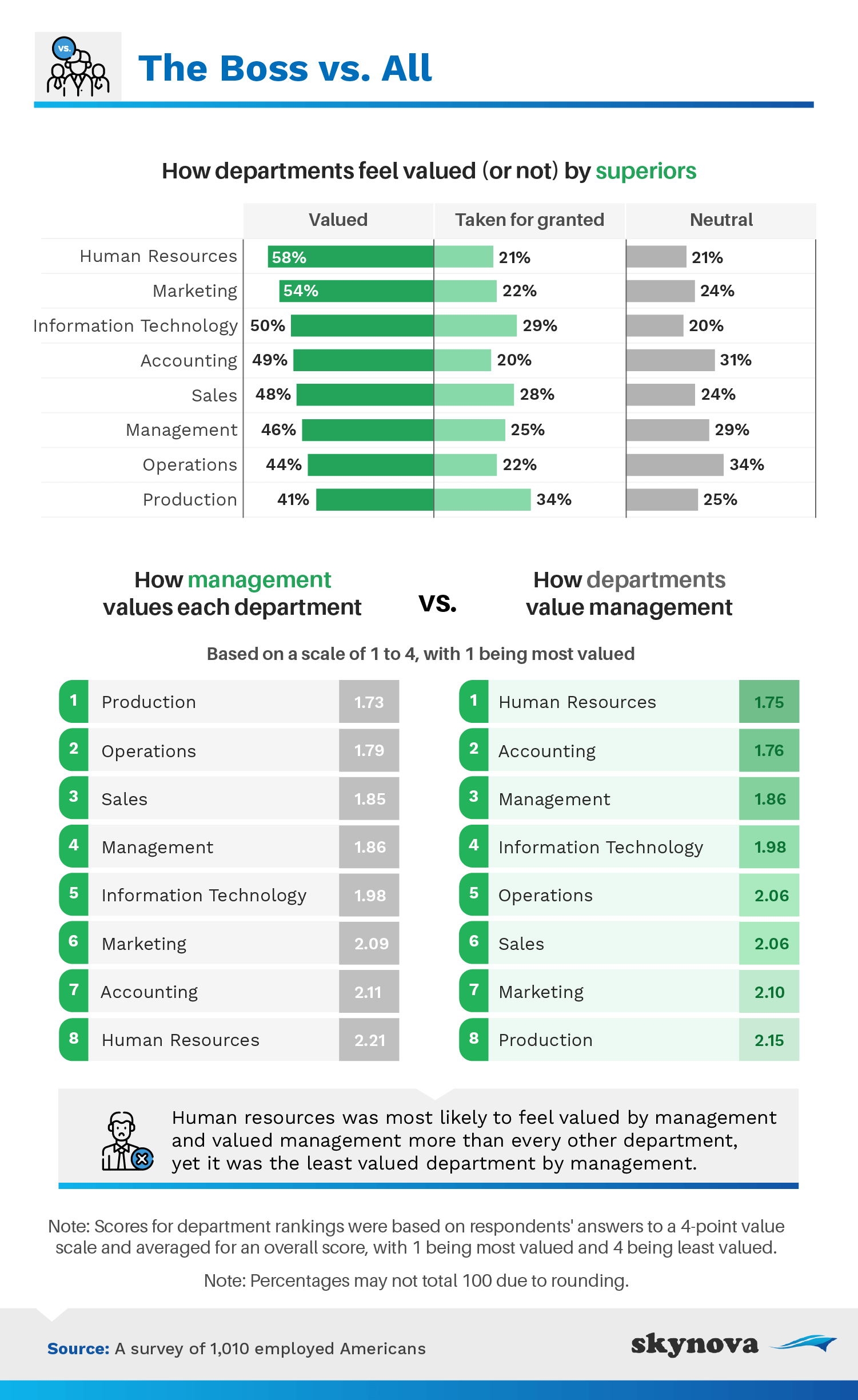
The production teams were more likely to feel taken for granted than any other department, though other departments were certainly familiar with the feeling. More than a third - exactly 34% - agreed that they felt taken for granted by their superiors. In spite of the importance of actually producing the product or service for a business, production felt relatively overlooked.
Another interesting dynamic played out with the human resources department. While HR did report feeling valued by their superiors, management actually valued HR the least. In fact, all teams seemed to downplay the importance of HR despite that particular department feeling valued by all others. Perhaps their specialties in managing the employee life cycle through highs and lows has naturally trained them to see the best in people, while others are less equipped to see the value of even the HR staff members that helped them get hired.
Taking a step back from superiors for a moment, we next wanted to look at peer relations. Did certain departments feel valued by one another? How did they value their own teams? How did they rate one another's productivity? And lastly, did this vary by company size? The same scoring method was used department to department that was used for management, with 1 being most productive/valued and 4 being least productive/valued.
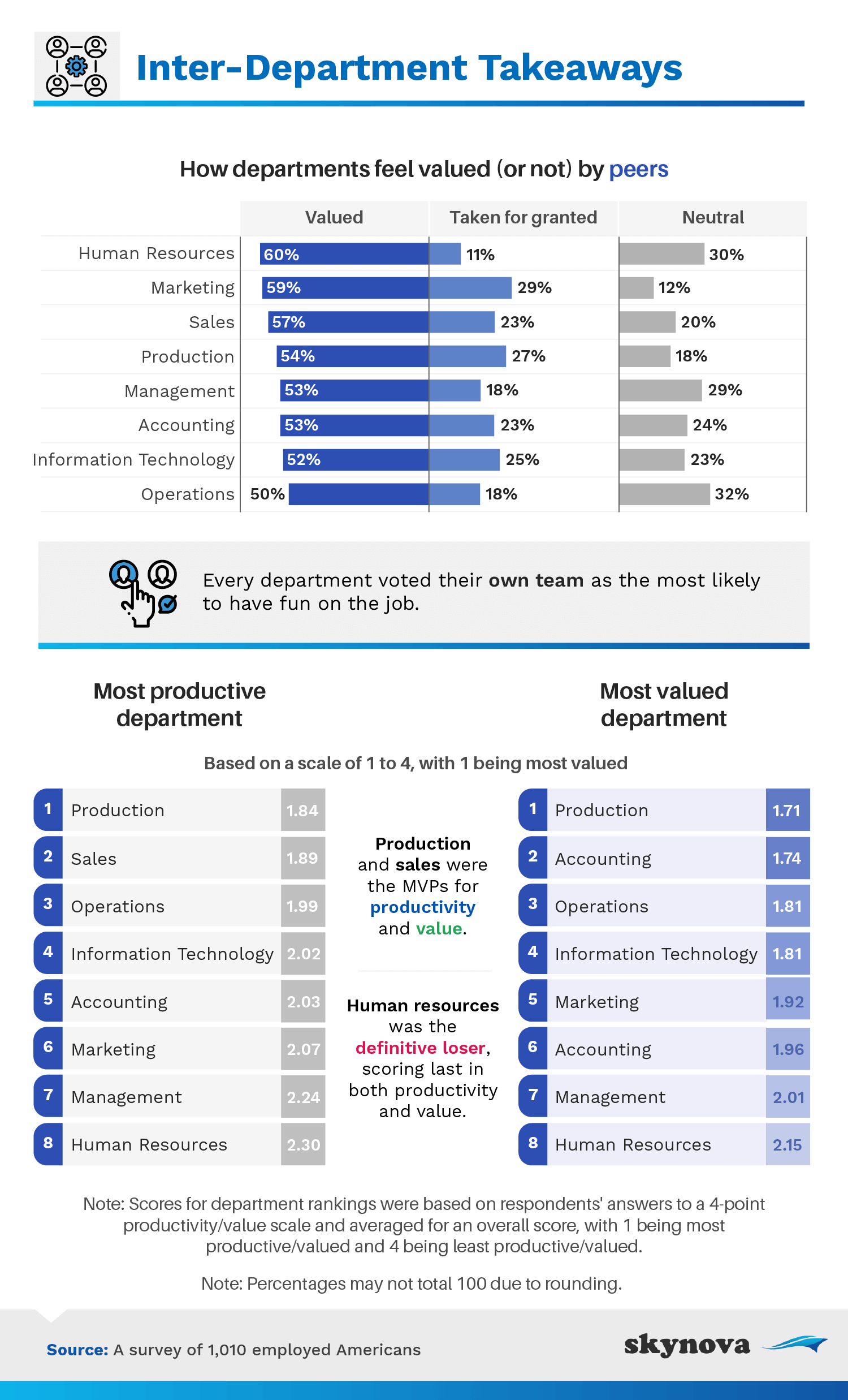
Marketing felt most undervalued by their peers. Though most departments gave them a relatively high productivity score, marketing perceived that their peers were failing to see their true value. Some business experts consider the marketing department to be the face of the business and one that promotes the very mission of the company. Perhaps this understanding is one internalized by the marketing team but not others who may consider their own role to be just as pivotal.
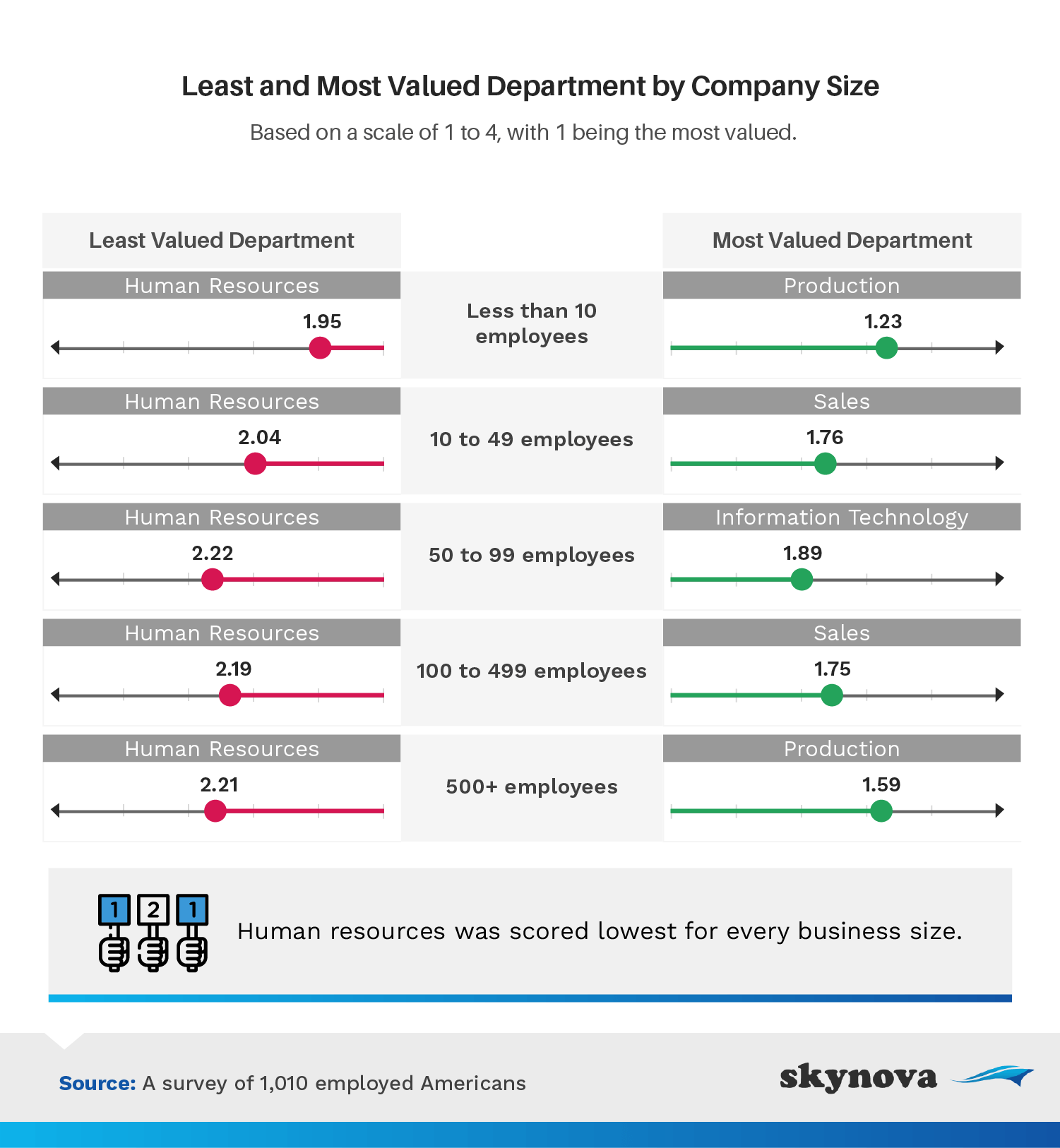
Peers were better able to understand the vital importance of production and sales than superiors were. Both production and sales received the top two scores from peers for their overall value and productivity. Once again, human resources was the definitive loser, with their peers struggling to perceive their value and production output.
Teams did find support from within, however - especially in terms of morale. When asked which department was most likely to have fun on the job, every single department answered with their own.
Even though feeling undervalued isn't ideal, things could often get even worse. The next piece of our study digs into employees feeling no respect at work. This time, responses were broken down by department as well as level of employment.
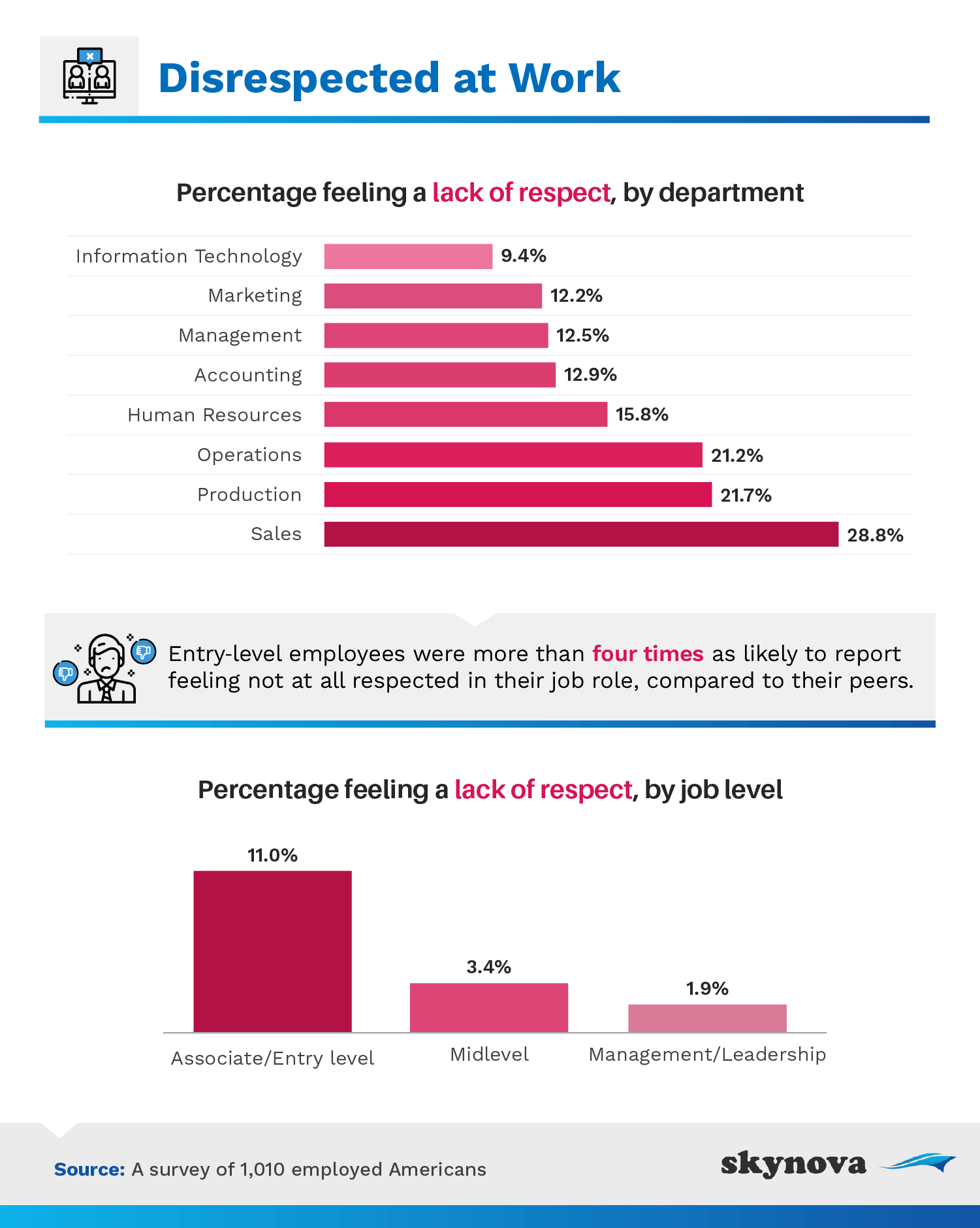
The most common areas for feelings of disrespect were found among the sales staff and/or entry-level employees. Experts estimate that dissatisfied employees are 15% less profitable than others and can even infect the satisfaction of otherwise happy employees. Tenure, which is also integral to a company's success, can be severely impacted by disrespect in the workplace. Considering the impact of respect we're seeing in this study and that respect is completely free for a company to give, it's discouraging to see lack of respect is still so rampant.
Flipping the script, our study looked into the importance of respect within a company and how common or uncommon it is among departments. Level of employment comparisons were also drawn again.
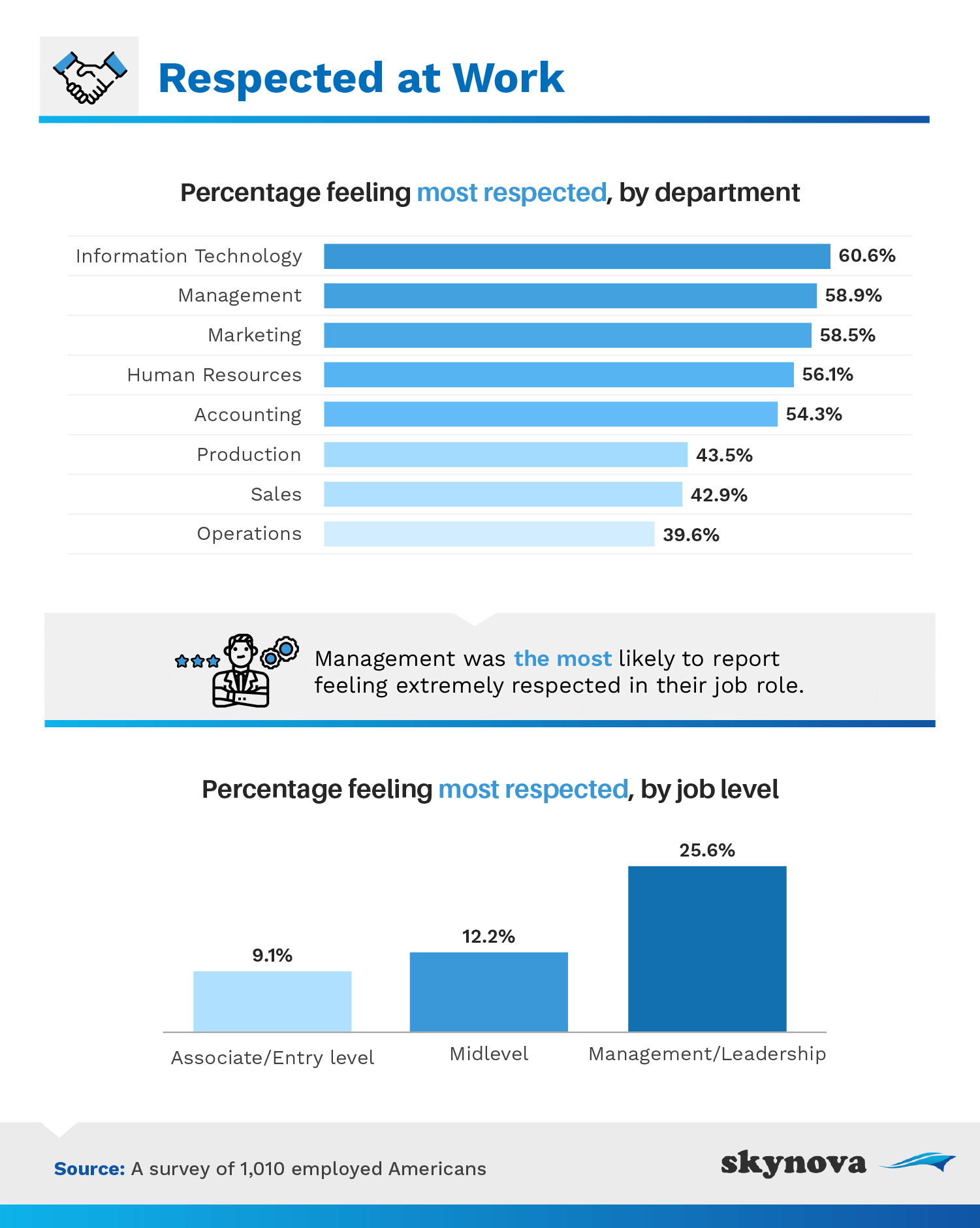
The IT department said they enjoyed feelings of respect more often than any other department. Perhaps this is due to the many times this department has likely saved fellow employees from highly stressful or even job-threatening tech issues. Their explicit purpose is often to help others, which is perhaps contributing to the respect they earn. Operations, on the other hand, felt respect the least often, making them likely candidates for low job satisfaction. And although management was the most likely level of employment to feel respected, only a quarter of managers surveyed felt respected overall.
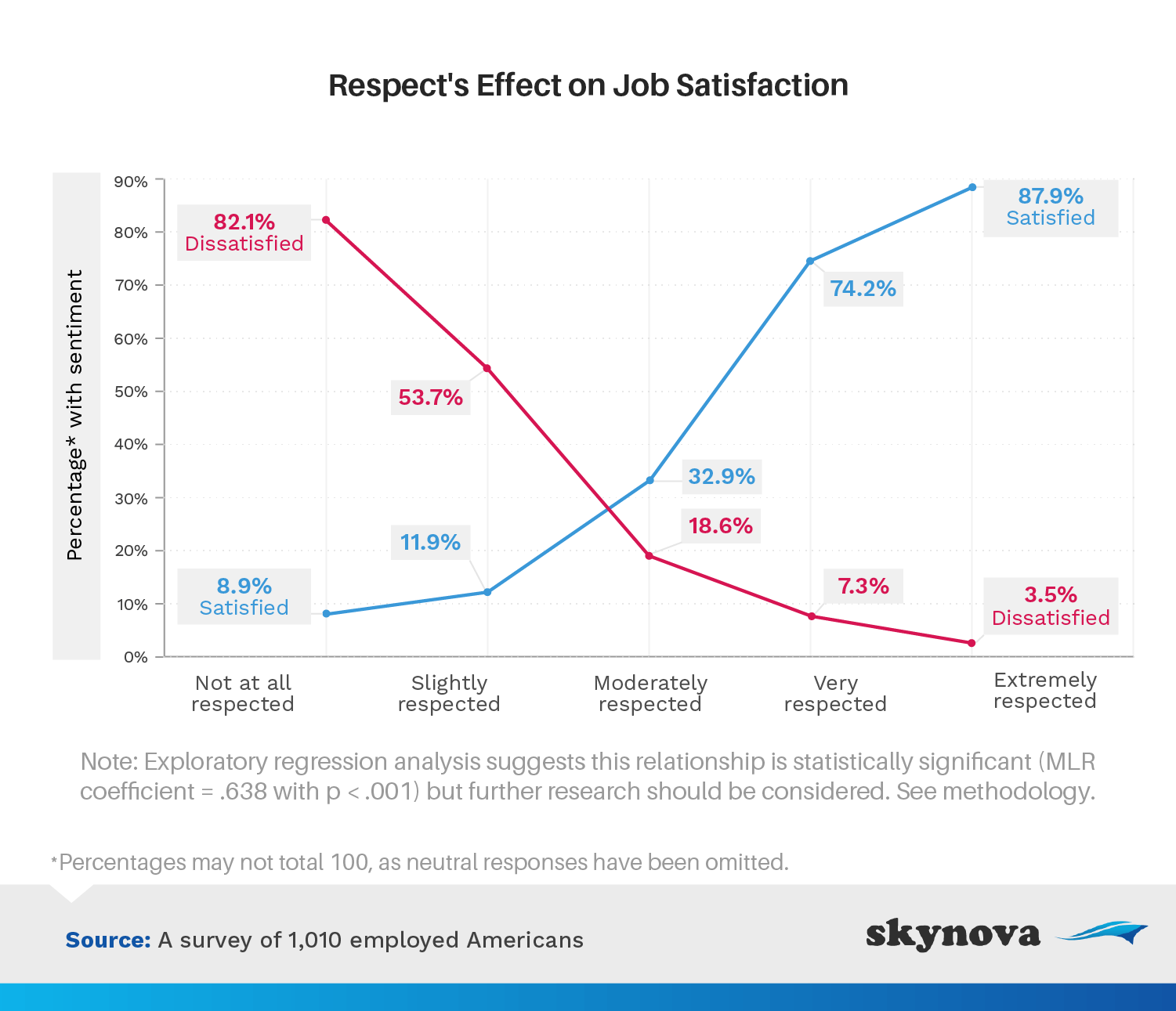
The impact of respect was astounding. Eighty-eight percent of those who felt extremely respected at work reported feeling very satisfied with their job. Consider that only 9% were able to say the same when they felt no respect. Speaking only to employees who answered that they felt no respect at all, we found that up to 82% of this group was likely to experience very low levels, or completely nonexistent levels, of job satisfaction.
Though each department was quick to call their own team "the most fun", responses were mixed when asked to rate the value and productivity of others. Every department had experience in feeling undervalued by others and taken for granted by management. The production teams felt particularly looked over, while most departments admittedly discounted the importance of human resources. Though human resources was ranked lowest in terms of productivity and value, it should be noted that their overall score was not too much lower than the pack.
Evidence also points to the emotional and financial impact that respect can have on a business. Employees and departments that felt respected experienced extreme increases in job satisfaction and even productivity. Especially in a time when mental health and financial stability have been so heavily tested by the pandemic, it's more important than ever to show kindness and appreciation for the people with whom you work.
Skynova creates online invoicing for small businesses. This means that businesses can get paid faster, look professional, bill anytime and anywhere, and stay organized, all of which can seriously impact the bottom line. If you email an invoice with our services, you will know when a customer opens it and be able to better manage that relationship. Skynova's professionalism and affordability makes it the perfect solution for any small business.
We collected 1,010 responses of employed Americans from Amazon Mechanical Turk. 52% of our participants identified as men, 47% identified as women, and less than 1% identifyied as nonbinary or nonconforming. Participants ranged in age from 19 to 88 with a mean of 38 and a standard deviation of 10.8. Those who reported no current employment or who failed an attention-check question were disqualified.
The data we are presenting rely on self-report. There are many issues with self-reported data. These issues include, but are not limited to, the following: selective memory, telescoping, attribution, and exaggeration.
Scores for department rankings were based on respondents' answers on a 4-point productivity/value scale and averaged for an overall score, with 1 being most productive/valued and 4 being least productive/valued.
*Though we found a significant effect of feeling respected at work on levels of job satisfaction (MLR coefficient = .638 with p < .001), we did not ask for a comprehensive battery of possible variables that might affect job satisfaction. It is possible that some other factors may affect feelings of respect and therefore more directly affect job satisfaction or be confounded by race, for which our sample was limited, or by other demographics our survey did not include. This content is purely exploratory, and future research should approach this topic in a more rigorous way.
Respect has gained an entirely new level of importance. If you think this information is important to share, you are welcome to disperse this study online. Just be sure you link back to this page and that your purposes are noncommercial in nature.